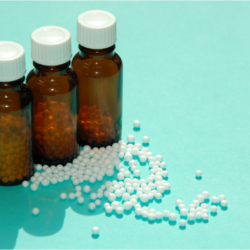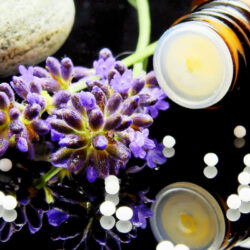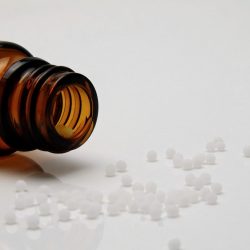Homeopathy can be effective for a number of stomatological problems, such as preparing a patient for dental surgery, preventing and treating post-operative haemorrhage, preventing and treating post-operative or non-operative infections, dental pain, especially post-operative pain, and as a complement to the treatment of wisdom tooth problems.
History of homeopathy in stomatology
Homeopathy, with its roots rooted in history, has gradually found its way into the field of stomatology. Its journey, from emergence as an alternative form of medicine to its integration into dental care, is fascinating and well worth exploring in depth.
What are the origins of homeopathy?
The history of homeopathy began in the 18th century with the German physician Samuel Hahnemann. Dissatisfied with the often brutal and ineffective medical practices of his day, Hahnemann sought a gentler, more holistic approach to healing. In 1796, he formulated the fundamental principle of homeopathy: “similia similibus curentur”, or “like cures like”.
This philosophy is based on the idea that substances that cause symptoms in a healthy person can, when administered in small doses to a sick person with similar symptoms, produce a curative effect. This theory was a radical departure from the conventional medical methods of the time, marking the beginning of a new era in the treatment of disease.
Its introduction into stomatology
The introduction of homeopathy into stomatology took some time, following in the footsteps of the gradual recognition of homeopathy as a medical discipline in its own right. At first, its use was marginal, often practised by dentists who themselves had training or an interest in homeopathy. These practitioners began to apply homeopathic principles to treat a variety of oral ailments, such as pain, inflammation, infection and bleeding gums.
As interest in more natural and less invasive treatment approaches grew throughout the 20th century, homeopathy gained popularity in the dental field. Case studies and patient testimonials began to highlight the benefits of homeopathy in the management of pain and post-operative complications in stomatology, leading to greater acceptance among oral health professionals.
At the same time, training and certification in homeopathy for dentists began to emerge, leading to a better understanding and more effective application of this practice in dental care. Today, although still the subject of debate in certain scientific circles, homeopathy has become a recognised component of the holistic approach to stomatology, offering a gentle, non-invasive alternative for the treatment of oral disorders.
Pre-operative care in stomatology
Some patients are anxious before dental surgery. Their reaction mode may require them to take Gelsemium or Ignatia. Others may benefit from :
Chamomilla :
This medicine is often indicated during teething episodes in infants, but is also suitable for adults who are hypernerve, temperamental, short-tempered and intolerant of pain. Odontalgia is aggravated by heat, but not relieved by cold.
Dosage: Take 9, 15 or 30 CH, 5 granules 1 to 2 times a day on average, for a few days before and after the operation.
Coffea tosta :
This homeopathic medicine is indicated for nervous, intelligent people with cerebral overactivity, who are easily insomniac (anticipatory stage fright). The fear of pain, like the pain itself, agitates them to the point of trembling. Coffea odontalgia is improved by contact with cold water.
Dosage: Take 9, 15 or 30 CH, 5 granules 1 to 2 times a day on average, for a few days before and after the operation.
Post-operative bleeding problems in stomatology
Arnica :
This medicine is indicated in cases of trauma involving the tearing of capillaries. If taken systematically, it reduces the risk of haemorrhage and speeds up the resorption of oedema, thereby facilitating healing and relieving pain.
Dosage: Take 9 CH, 5 granules a day, for 3 days before the operation, then 5 granules 2 to 6 times a day after the operation, depending on the intensity of the bleeding.
Phosphorus :
A homeopathic medicine that prevents haemorrhage, it should be given systematically the day before and the morning of the operation, 1 dose of 9 CH each time. If, despite these 2 medicines, abnormal bleeding occurs, Arnica and Phosphorusare combined.
In the context of stomatology, the homeopathic remedy Phosphorus may be indicated in the following situations:
- Bleeding Gums: Phosphorus is often used for bleeding gums, especially when the bleeding is heavy and occurs for no apparent reason.
- Dental Pain: This remedy can be effective for dental pain that is exacerbated by hot or cold and for pain that radiates to other parts of the head.
- Mouth ulcers: Phosphorus is sometimes prescribed for ulcers in the mouth, especially if they are painful and bleed easily.
China :
In case of haemorrhage of black or dark blood, 5 granules in 5 CH every half hour or every hour, alternating with Arnica. Space out according to improvement.
In stomatology, the homeopathic remedy China (or Cinchona officinalis) is generally indicated in the following cases:
- Mouth bleeding: China is used to treat bleeding gums, especially if they are persistent or recurrent after dental procedures such as extractions.
- Post-Operative Fatigue: In cases where the patient feels particularly tired or exhausted after dental surgery, China can help restore energy and combat general weakness.
- Dental Sensitivity After Treatment: For teeth that have become excessively sensitive after treatments such as fillings or other dental procedures, China can be beneficial.
Millefolium :
For red, shiny, fluid blood haemorrhage with little or no pain. It is also a good medicine for patients who tend to bleed a lot from the slightest cut (in the absence of any haemopathy) or for women with very heavy periods, with the above characteristics.
Dosage: In case of haemorrhage of black or dark blood, 5 CH granules of Millefolium every half hour or every hour, alternating with Arnica. Space out according to improvement. In these cases of abnormal haemorrhage, Phosphorus 9 or 15 CH may also be repeated at the rate of 1 dose every 6 hours or so.
Post-operative or non-operative infections in dentistry
To combat the risk of infection, 2 medicines should be taken systematically: Pyrogenium and Hepar sulfur. Depending on the patient’s clinical reaction, these can be supplemented with Arsenicum album, Aurum muriaticum, Mercurius solubilis or Apis.
Pyrogenium :
This biotherapeutic can be prescribed preventively, before the operation, when an underlying infectious focus is feared.
Dosage: Take 5 granules of Pyrogenium 9 CH morning and evening for 2 days before the operation. In curative therapy, take 5 granules of Pyrogenium 9 CH morning and evening for 3 or 4 days, followed by Hepar sulfur 2 hours after each dose.
Hepar sulfur :
This great homeopathic medicine for acute suppurations is taken in high dilutions, as low dilutions on the contrary favour suppurations.
Dosage: 5 granules in 15 or 30 CH morning and evening for 3 or 4 days.
In addition :
Arsenicum album :
In cases of sharp, burning pain, improved by warm applications, in any form whatsoever. Discharge may be serous, bloody or purulent, but is always highly nauseating and excoriating. The patient may be depressed and tired as a result of the infectious process, which has a serious impact on the general state of health. They may be very thirsty. But these general symptoms are not essential for taking the medicine.
Dosage: Depending on the similarity, take 7, 9 or 15 CH, 5 granules 2 times a day, around 10 a.m. and 5 p.m.
Aurum muriaticum :
For the reasons given above, this homeopathic medicine is preferred to Aurum metallicum in suppurations of short bones in general and suppurative processes of the jaw in particular.
Dosage: Take in 9 CH at least, 5 granules around 10 a.m. and 5 p.m.
Mercurius solubilis :
This medicine is prescribed for characteristic mouth and throat signs:
- Thick, whitish, viscous tongue, retaining the imprint of the teeth (on the sides when biting).
- Saliva stringy, foul-smelling, but thirsty.
- Spongy, bleeding gums.
Dosage: Take 9 or 15 CH, 5 granules around 10 a.m. and 5 p.m., as low dilutions may encourage suppuration.
Apis mellifica :
Taken in cases of severe oedematous reaction, as is often the case with inflammatory phenomena of the mouth.
Dosage: Take 15 CH, 5 granules every 30 to 60 minutes, spacing out according to improvement.
When faced with a purulent collection which can be drained easily, take Hepar sulfur 5 CH and Mercurius solubilis 5 CH, 5 granules alternately every 4 or 6 hours, for example, until the abscess is incised or bursts. Mouthwash several times a day with 30 drops in half a glass of water of a mixture of Phytolacca T.M. and Calendula T.M. in equal parts.
Pain in stomatology
We are faced with several situations:
- Surgical dental pain.
- Infectious or inflammatory dental pain.
- Dental neuralgia, which is often paroxysmal, in the trigeminal area of the lower or upper jaw.
Whenever possible, etiological treatment should be used. In addition, consider :
Arnica :
Arnica is a homeopathic medicine with a capillary tropism, it is active both on pain after dental avulsion and on dental neuralgia, in 9 CH, combined with :
Hypericum perforatum :
This is the remedy for trauma to nerve endings. The pain radiates along the path of the nerve concerned. It is throbbing, intolerable and aggravated by the slightest jolt.
Dosage: Take 15 or 30 CH at the rate of painful paroxysms.
Mezereum :
This drug causes experimental irritation of the mucous membranes and periosteum, mainly in the malar region. It can therefore be used as an analgesic in stomatology. It is particularly effective when the pain is due to an additional infectious process.
Recommended dosage: Take 5 or 7 CH, 5 granules 2 to 4 times a day.
If the pain presents modalities or clear characteristics evoking the pathogenesis of a drug, it is necessary to take :
Aconitum :
Pain after a sudden cold spell, aggravated around midnight by the sudden sharp cold.
In homeopathy, Aconitum Napellus is mainly used in the following cases:
- Onset of fever: Used at the onset of febrile states, especially after exposure to cold.
- Acute Respiratory Infections: Effective at the onset of respiratory illnesses such as laryngitis.
- Emotional Shock: Indicated for acute reactions to fear or stress.
- Acute Pain: Useful for sudden and intense pain, including dental pain.
- Cardiovascular disorders: Used to treat symptoms such as palpitations, particularly in the presence of anxiety.
Belladonna :
Belladonna is the medicine for pulsating pain, with dryness of the mucous membranes at the onset of an inflammatory phenomenon.
Apis :
Apis is a homeopathic remedy used when stinging, burning pain, improved by cold with inflammatory oedema.
Arsenicum album :
Arsenicum album granules are recommended when the pain is burning and is improved by heat.
Coffea tosta or Pulsatilla :
The homeopathic medicines Coffea tosta and Pulsatilla are used when the pain is improved by the contact of cold water.
Chamomilla :
The homeopathic remedy Chamomilla is used in cases where pain is aggravated by heat but not improved by cold.
Cheiranthus :
This homeopathic remedy is useful in 30 CH, 1 dose every 6 or 12 hours in cases of trismus due to an oral-pharyngeal disorder, wisdom tooth accident in particular.







